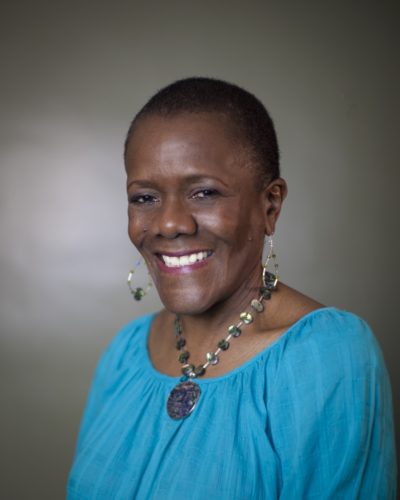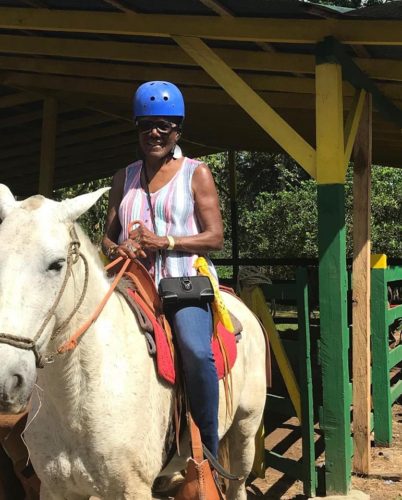“Secrets can damage your spirit and rot your soul. And that’s what I felt was happening to me.” – Asha Molock

At 50, Asha Molock was enjoying a successful career as an educator in the School District of Philadelphia and had found love again. Life was flowing the way it should until a medical diagnosis shook her to her core. She was HIV-positive.
“I thought it was a gay, white man’s disease, or something that younger people contracted,” Molock told The Weight She Carries. “By me being with one partner, and we were both in our 50s, I didn’t think it would affect me.”
Just a year earlier, she had tested negative for HIV. So how could she have contracted it at this stage in her life?
When she had begun dating someone at 50, the thought of contracting HIV was the furthest thing from her mind.
“I just talked to him a little bit about whether he had ever injected any drugs, and he said no. I asked him if he had a sexual relationship with any man, and he said no. So, I thought we were fine. We started dating and within the next year, he got sick,” she said.
Molock took him to the hospital where he received an AIDS diagnosis. The news prompted Molock to get tested. By the time her results came back, she had mentally prepared herself for the worst and was numb.
“What I understand now that I didn’t know then is that the lack of estrogen due to menopause changes the lining of your vaginal wall and it gets thinner. What happens is that there is not much lubrication, so the vaginal walls tear more easily, making it easier to contract HIV,” Molock explained.
Contrary to popular belief, older people have many of the same HIV risk factors as the younger population. Since there is no concern about becoming pregnant, women in menopause may be less likely to use a condom. In addition, doctors to older patients often fail to ask them about sexual behaviour or drug use.
As she approached 50, Molock had asked one of her previous doctors to test her for HIV. Her doctor’s response: “For what? It’s not necessary.”
“I remember going to my gynecologist and saying that I was bleeding during sex, and she told me to make sure I used enough lubrication. But she never told me about my (HIV) risk. Probably because I’m older,” Molock said.
Soon after her diagnosis, Molock decided to focus on educating herself on HIV and how to care for her health but kept her diagnosis a secret.
“I kept quiet about my status for 10 years mainly because the man whom I eventually married didn’t want people to know. He was concerned about the stigma attached to it and told me I couldn’t tell anybody because people would treat me differently. It was his way, I think, of preventing people from connecting it to him.”
Asha Molock

The couple got married and relied on each other for emotional support. Molock also joined a women’s HIV support group and subscribed to HIV magazines.
But after the marriage ended, she found herself feeling alone and depressed about her status. The only people in her life who knew were her mother and daughter. Whenever people came by to visit her, she would scurry to hide her magazines and medication before they arrived.
“After a while, I thought this was terribly absurd because here I was hiding in my own house,” she said.
“When you’re holding a secret, you are hiding from yourself and you’re hiding from your life. You can never be happy that way. After I started looking at my life I thought: you know what? I have to have some joy in my life. I have to look deep inside myself to see what’s going to make me happy.’ I know disclosure is not for everybody, but at that point in my life, I decided I needed to be free. And once I let it out, I blossomed into a totally different person. I just wanted to live my best life and experience different things like traveling and just being happy.” – Asha Molock
Gradually, she began to share her truth with people outside her support group. The first time she told her story to a local newspaper, she called the paper shortly after the interview to request that they refrain from using her real name or any identifying factors in the story.
“They respected my decision and ran the story. But after I made the request, I felt kind of sad because I was still living in secrecy. And I realized that I was actually denying another woman my story,” she said.
Another opportunity to share came and Molock did a TV interview for a story on an organization that provided services to people with HIV/AIDS. But the story never aired.
Molock sighed with relief.
She was approached a third time, this time to do a story with Philadelphia Daily News for National Women and Girls HIV Awareness Day.
“I thought, ‘Okay, Creator, you keep calling me out so it really is time for me to share,’” she said. “Sometimes we let fear take control and take a life of its own inside our heads, and we are thinking the worst. But my family has been so supportive of me. And it turned out to be a great article,” she said.
“This experience has taught me that I am stronger than I ever imagined. I know that I have to set an example for my family, especially for my daughter and my granddaughter. I’m standing on the shoulders of my ancestors…everything that they went through – being brought to this country through slavery. If I crumble, then what are my descendants going to have to build on? I thank the Creator and my ancestors all the time because that is where my strength comes from.”
Asha Molock
Molock represents a large number of women who are living with HIV. Many are still grappling and coming to terms with their diagnosis and are fearful or what the future holds for them. To those women, Molock encourages them to embrace their diagnosis completely.
“Dig down into your spirit and find your real self. When you find that real woman, love that person because nobody can love you more than you love yourself,” she said. “We’re always putting other people ahead of ourselves. So, we have to learn that we have to put ourselves before other people, and that’s not selfish.”

“I want other women to know that they’re not alone and they didn’t do anything wrong. Some people want to put a behavior on it but sometimes circumstances could be beyond your control, like if you were a victim of incest or domestic violence and you were put out of your home and you have to do something that is not honorable to make ends meet. Those are circumstances and sometimes they are beyond your control. Just hold your head high and know that you are worthy of having a good life, you’re worthy of the best in the world.” – Asha Molock
Molock is aware of the stigma associated with being HIV positive, but she chooses not to let it bother her. She is now an HIV/AIDS advocate and has authored two books: Gaining Strength from Weakness: 101 Positive Thoughts for HIV-positive People and The Underground Woman: From Prisoner to Freedom. She is a member of the Positive Women’s Network, and the Quality Improvement Committee at Bebashi Transition to Hope, an AIDS Service Organization based in Philadelphia.
She has been featured in numerous media outlets, including Philadelphia Daily News, POZ, A&U, and Positively Aware Magazines, KYW Channel 3 News, Talk Fuzion TV, WPEB community radio, the Black AIDS Weekly, TheBody.com and The Westside Gazette.
“For 10 years I ran away from my story. I didn’t want to own it. It was chasing me and it ran me down. There were times I was running and it was running alongside me. I was looking to the side and kept running and saying, ‘That’s not my story!’ I was running, but I had to make peace with it. You have to make peace with things you don’t understand sometimes. But once I made peace with it, I was able to walk inside my story, and then own it.”
Asha Molock
Vimbai E. is a content marketer, ghostwriter, and the founder of The Weight She Carries. With hundreds of articles and stories publishing online, in print and for broadcast, her love of language and storytelling shines through every piece of writing that bears her name.
